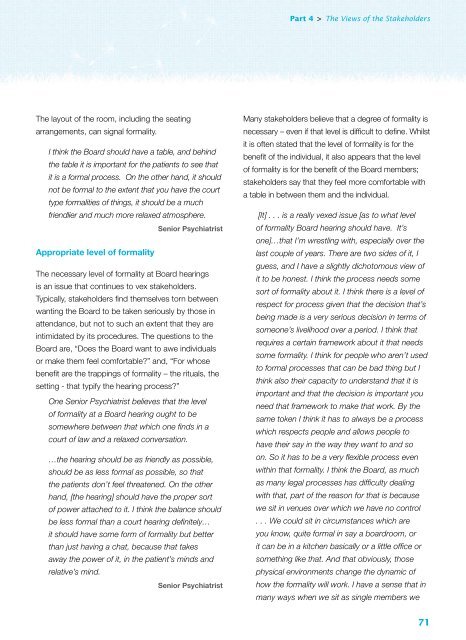Lacking Insight - Community Law
Lacking Insight - Community Law
Lacking Insight - Community Law
- No tags were found...
Create successful ePaper yourself
Turn your PDF publications into a flip-book with our unique Google optimized e-Paper software.
Part 4 > The Views of the StakeholdersThe layout of the room, including the seatingarrangements, can signal formality.I think the Board should have a table, and behindthe table it is important for the patients to see thatit is a formal process. On the other hand, it shouldnot be formal to the extent that you have the courttype formalities of things, it should be a muchfriendlier and much more relaxed atmosphere.Senior PsychiatristAppropriate level of formalityThe necessary level of formality at Board hearingsis an issue that continues to vex stakeholders.Typically, stakeholders find themselves torn betweenwanting the Board to be taken seriously by those inattendance, but not to such an extent that they areintimidated by its procedures. The questions to theBoard are, “Does the Board want to awe individualsor make them feel comfortable?” and, “For whosebenefit are the trappings of formality – the rituals, thesetting - that typify the hearing process?”One Senior Psychiatrist believes that the levelof formality at a Board hearing ought to besomewhere between that which one finds in acourt of law and a relaxed conversation.…the hearing should be as friendly as possible,should be as less formal as possible, so thatthe patients don’t feel threatened. On the otherhand, [the hearing] should have the proper sortof power attached to it. I think the balance shouldbe less formal than a court hearing definitely…it should have some form of formality but betterthan just having a chat, because that takesaway the power of it, in the patient’s minds andrelative’s mind.Senior PsychiatristMany stakeholders believe that a degree of formality isnecessary – even if that level is difficult to define. Whilstit is often stated that the level of formality is for thebenefit of the individual, it also appears that the levelof formality is for the benefit of the Board members;stakeholders say that they feel more comfortable witha table in between them and the individual.[It] . . . is a really vexed issue [as to what levelof formality Board hearing should have. It’sone]…that I’m wrestling with, especially over thelast couple of years. There are two sides of it, Iguess, and I have a slightly dichotomous view ofit to be honest. I think the process needs somesort of formality about it. I think there is a level ofrespect for process given that the decision that’sbeing made is a very serious decision in terms ofsomeone’s livelihood over a period. I think thatrequires a certain framework about it that needssome formality. I think for people who aren’t usedto formal processes that can be bad thing but Ithink also their capacity to understand that it isimportant and that the decision is important youneed that framework to make that work. By thesame token I think it has to always be a processwhich respects people and allows people tohave their say in the way they want to and soon. So it has to be a very flexible process evenwithin that formality. I think the Board, as muchas many legal processes has difficulty dealingwith that, part of the reason for that is becausewe sit in venues over which we have no control. . . We could sit in circumstances which areyou know, quite formal in say a boardroom, orit can be in a kitchen basically or a little office orsomething like that. And that obviously, thosephysical environments change the dynamic ofhow the formality will work. I have a sense that inmany ways when we sit as single members we71
















